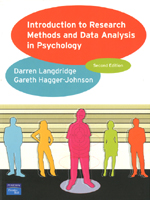Introduction to Research Methods
& Data Analysis
in Psychology,
2nd edition
By Darren Langdridge & Gareth Hagger-Johnson
June 2009
Pearson / Prentice Hall
ISBN: 9780131982031 
558 Pages, Illustrated
$77.50 paper original
Introduction to Research Methods and Data Analysis in Psychology 2e presents quantitative and qualitative research methods and the most widely used techniques for collecting and analysing data. It provides clear and accessible coverage to equip the reader with an understanding of the research process and the practical skills they need to collect and analyse data. This second edition has been thoroughly revised and updated to include a number of new chapters and additional topics such as e-research, mixed methods, and R (a statistical software package). Detailed information is provided on experimental design and statistical analysis by hand and using SPSS v. 16.0. Expanded coverage of a range of areas including literature reviewing, the statistical techniques of ANOVA and MANOVA, and psychometrics is also provided.
The text assumes that the reader has no previous knowledge of research methods or psychology and is therefore essential reading for undergraduate psychology students plus highly recommended for students on other social and health science courses.
Contents Section 1 – Introducing research methods
1. Starting out in research 2. Variables: definition and measurement 3. Reliability, validity, sampling and groups
4. Interviews and observation 5. Questionnaires and psychometric tests 6. Experimental and quasi-experimental designs
7. E-research
Section 2 – Analysing quantitative data8. Fundamentals of statistics
9. Entering and manipulating data 10. Graphical representation and descriptive statistics 11. Bivariate analysis 1: exploring differences between variables 12. Bivariate analysis 2: exploring relationships between variables 13. ANOVA 14. MANOVA
15. Regression
16. Introducing R
Section 3 – Analysing qualitative data17. Fundamentals of qualitative research 18. Transcribing, coding and organising textual data 19. Phenomenological research methods 20. Grounded theory 21. Discourse analysis 22. Life story and narrative research 23. The use of computers in qualitative analysis
24. Mixed methods
Section 4 – Reporting findings25. Ethics and politics 26. Reporting and presenting findings References
Features
- Study boxes - giving examples of the application of research methods and data analysis with classic and cutting-edge research in psychology
- Activity boxes - providing exercises designed to further cement knowledge and understanding
- Information boxes – providing further coverage of key issues to help illustrate concepts introduced within the text
- Command boxes – offering detailed instructions of how to carry out statistical analysis using the latest version of SPSS
- Detailed information on experimental design and statistical analysis by hand and using SPSS v. 16.0
- Updated information on the major methods used for qualitative research
- New chapter on e-research
- New chapter on mixed-methods
- New chapter on R (statistical software package)
- Expanded coverage of a range of areas including literature reviewing, the statistical techniques of ANOVA and MANOVA, and psychometrics
Return to main page of Trans-Atlantic Publications